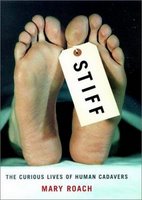
Mary Roach, Stiff: The Curious Lives of Human Cadavers
If you're looking for a good non-fiction read that's both fascinating and hilarious, here's your book.
From the start, Roach displays a playfulness and wit when discussing her subject matter, but it never veers into the irreverent. In fact, she is always respectful of the dignity of those who have given their bodies to scientific inquiry and research, and her humor has the tone of when you are at the funeral of a loved one and you're keeping the conversation lighthearted because the circumstances are anything but. Yet, she balances nicely that wit with the probing of a journalist who is, well . . . curious, curous about how our bodies can contribute to science long after we've departed from them.
And that's the part that I found wildly compelling here. Roach explores the various ways in which, when donating one's body to scientific research, that body can be used -- from automotive safety testing (instead of crash-test dummies) to organ harvesting, from military ballistics testing (as targets) to reconstructive surgery practice, from airplane wreckage study to cannibalism, and many more. I expect that you will be as fascinated as I was to learn, for example, how cadavers are preferred over crash-test dummies when testing automobile safety (windshield strength, airbag deployment, restraining belt safety, etc.) because (unlike a C-TD) they help us more accurately learn "how much force a skull or spine or shoulder can withstand" without using live subjects (p. 87), or how authorities use a complex combination of recovered airplane wreckage, seating charts, and descriptions of body remains to determine the cause of an airline disaster.
As a literature teacher, I found this book to have endless connections with works of fiction I've taught over the years, because Roach offers history, statistics, and research on such topics as decapitation (Macbeth), medicinal cannibalism (Moby-Dick), experiments in live burial (Poe's fiction), reanimation (Frankenstein), wacky experiments on the human body over the centuries (Gulliver's Travels), and even a recent eco-sensitive movement within the funeral industry (albeit a small one, out of Sweden) to permit one's remains to be turned to compost and, say, used to enrich the soil of a tree (something which Henry David Thoreau, I believe, would have loved!).
This is an excellent book!
No comments:
Post a Comment